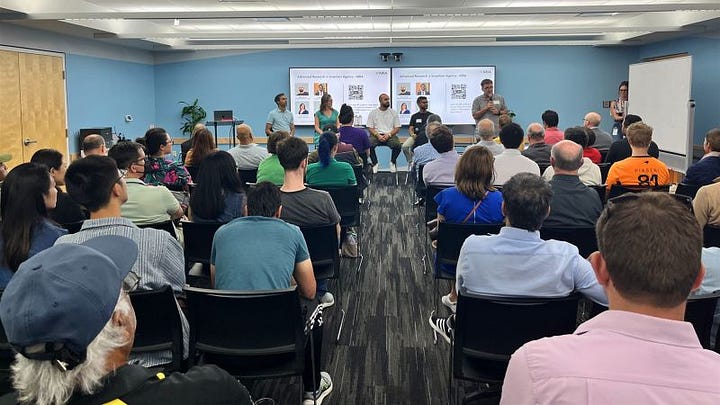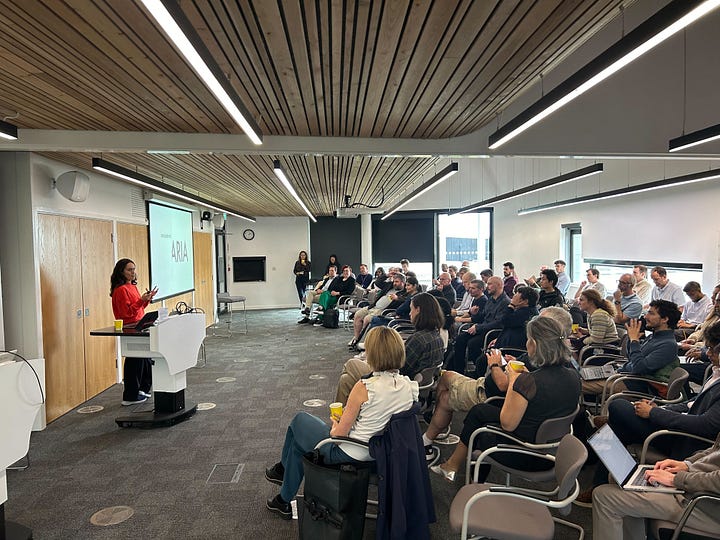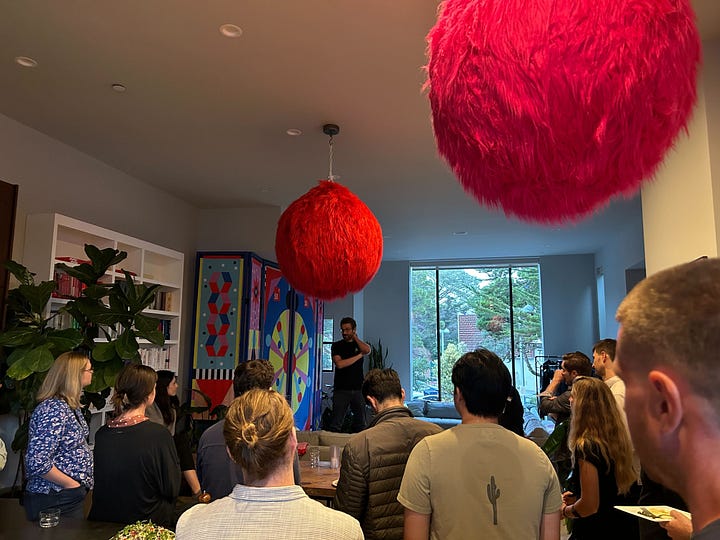How we found our new Programme Directors
Eight new Programme Directors are joining us to push the boundaries of what’s possible. Here’s the story of how we found them.
What's new at ARIA
Meet our new Programme Directors: technical leaders with hands-on experience in translating ideas into real-world impact. Discover the areas they’re exploring, read more in this piece from the Financial Times, and dive into our recruitment process below.
Introducing our Safeguarded AI TA3 Creator teams. We’re funding teams of UK-based researchers looking to use AI systems with unique quantitative safety guarantees to unlock transformative improvements in our critical infrastructure. Meet them here.
Funding calls in Safeguarded AI TA1.2 & TA1.3 are closing soon. We’re looking for teams of software developers to build an extendable, interoperable language and platform to maintain formal world models and specifications. Submit your full proposal for TA 1.2 and TA 1.3 here by 9 April.
Live events and opportunities with our Activation Partners.
Virtual Q&As on the Encode AI-for-science fellowship which is open for applications until 30 April:
Nucleate is hosting Sustainable Innovation lunches across the UK. These will share resources on developing breakthrough innovations and navigating entrepreneurship in the sustainability sector.
Renaissance Philanthropy has launched the UK Horizons Programme to grow scientific networks and attract patient capital across the UK, and to develop new approaches to research translation in our opportunity spaces.
The search for cohort two
We’re excited to introduce our second cohort of eight new Programme Directors (PDs) – world-class scientists, engineers, and entrepreneurs who will push our work into new scientific domains. Their work will seek to uncover breakthrough discoveries that have the potential to drive massive economic growth.
The role of a PD is unusual and multidisciplinary, making the right people hard to find. Here’s a look at the approach we took to attract some of the world’s top talent to ARIA.
The question that started it all
"If you could direct £50m to drive a bold and focused scientific/technical step-change in human progress, what would you do?"
This simple question kicked off our search and the pressure was on to find the right people. First-principles thinking and deep expertise were just the baseline. We were after something rarer: those able to see connections where others only see confusion, who imagine futures very few others can, and who are audacious enough to chase breakthrough ideas down unconventional paths. For this second cohort we also set our sights on scientists with a track record of building ventures, communities and technologies that have made a mark on society.
“To unlock breakthroughs, we don’t just need extraordinary people — we need a diverse portfolio of bold bets,” says ARIA CEO Ilan Gur. “That’s why we’ve brought in exceptional talent and given them the freedom to chase big ideas and break new ground. With both cohorts in place, we’re expanding our capacity to pursue breakthroughs that could build new industries, boost productivity, and improve lives across the UK and beyond.”
Taking ARIA on the road
Finding the right people meant casting a wide net. So in the summer of 2024, we took ARIA on the road, hosting events across the UK and around the world – including Boston, San Francisco, Copenhagen, and Geneva – tailored to the scientific and entrepreneurial strengths of each location.
This helped us connect with a broad mix of potential candidates. One was Ivan Jayapurna, an incoming PD from the University of California, who applied after attending one of our meetups in San Francisco.
“It was clear from meeting the team that ARIA takes ambitious ideas seriously,” Ivan says. “Their commitment to building optimism and humanitarianism back into science just clicked. I kept hearing from both academia and industry that big ideas were too risky. ARIA backs you with conviction, a whole community of people, and the space to grow something that could genuinely change the world. That got me excited to apply.”




Applications open up
Our applications opened last September, challenging applicants to envision how they would direct £50 million to pursue visionary science and technology breakthroughs that could reshape society and the economy. As well as capturing technical insights from their field of expertise, we asked them to reflect on their experience of building something from scratch.
“An ARIA Programme Director isn’t defined by academic credentials or a particular professional background,” explains Pippy James, our Chief Product Officer. “We look for individuals with bold ideas and the drive to make them real – people who can imagine a different future and bring others around them to help build it. It’s that combination of curiosity, relentless focus, and the ability to spark momentum that sets them apart."
The interviews
In just a few weeks, more than 300 people applied. The calibre of applications we received was high, so deciding who to invite to interview wasn’t straightforward. We took a criteria-led approach, evaluating candidates for qualities such as creative independence of thought, adaptability, and an ability to lead with conviction. From there, we advanced select candidates to an interview process designed to reveal how they think.
The first interviews were held with members of our senior leadership team, who pressed candidates on their vision and adaptability. Some questions invited counterintuitive perspectives: "Tell us about a scientific idea you believe is important or true that might sound implausible or even irrational." Others pushed them to stretch their ambition. "Take this vision you've set out and push it even further into impossible territory. What would that look like? What's the version that you'd be embarrassed to say out loud?"
To identify leaders with an entrepreneurial focus, we also introduced a new criterion: value perception — the ability to connect technical ideas to real-world applications. This challenged candidates to see how emerging capabilities might translate into societal or economic change, anticipate adoption challenges, and think strategically about how breakthroughs could take root in the world.
"With cohort one, this wasn't a formal selection criteria," Muji Ahmedi, Product Operations Lead, recalls. "But we saw it again and again in the PDs we ultimately brought in – an ability to connect technical insight with real-world relevance, and to chart a course from discovery to impact.”
Next up was the technical interview. External experts joined our leadership team for bespoke technical interviews, each designed around the candidate’s area of expertise. The focus was on the scientific and technical foundations: research methodologies, key constraints, and the specialised knowledge needed to make meaningful progress in the field. Standout candidates married the capacity to both ideate boldly and translate vision into tangible action.
Finalist day – building a cohort
To increase the odds of success, we knew these PDs needed to function not just as individuals, but as a group. Pursuing breakthroughs at the edge of the possible requires collaboration, critique, and creative tension across disciplines – so the value of the cohort isn’t just in the people we select, but in how they push each other forward.
That was our ambition for our ‘Finalist Day’ – which brought our shortlisted candidates together for lightning talks and group exercises designed to reveal how they think, interact, and collaborate.
“We want a diverse range of Programme Directors,” said Luke Simpson, ARIA’s Talent Acquisition Manager, “not just because of the variety of ideas they bring as individuals, but because of what happens when those ideas collide. The cohort model is central to ARIA — it's about creating a group dynamic where people challenge, stretch, and build on each other”.
The lightning talks – short presentations proposing novel solutions to societal problems — showcased a range of visionary ideas. One candidate proposed exploring how machines can match birds in unpowered, endurance flight; another outlined the possibility of programming stochasticity and heterogeneity to fabricate ‘living’ synthetic materials; and a third explored translating solutions from ant, bee, wasp and termite superorganisms to human health.
These were not final programme proposals – what Programme Directors ultimately pursue will be shaped during their first months at ARIA. For us, the talks were a window into how candidates distilled complex technical ideas into compelling narratives, demonstrated independence of thought, and conceived of transformative capabilities in real-time. Equally important was how they responded to others’ ideas – building on them, challenging them and sharpening each others’ thinking.
“What made Finalist Day so energising wasn’t just the depth of technical talent — it was seeing people from completely different fields find unexpected overlap,” says Ilan. “Watching materials scientists, virologists, machine learning researchers, and genomicists connect ideas in real time — that was a glimpse of the kind of collaboration that can lead to something truly new.”
Then, it was decision time.
Our vision for the second cohort
From a world-leading virologist who has accelerated the detection of emerging pathogens, to a physicist who has developed next-gen radiation detection for global use – our 8 new Programme Directors are now developing ideas that may seem too ambitious, complex or speculative but if true, could deliver enormous societal and economic impact for the UK and beyond.
They span diverse backgrounds, disciplines and career stages – and make up a dynamic group united not by a single field but by a shared commitment to changing the future. “What strikes me about this group is their remarkable diversity coupled with a powerful, shared commitment to change the future of the UK and the world,” explains Pippy. “They bring the kind of ambition and originality that doesn’t just ask what’s possible — it asks what else could be.”
Get to know them below and see more on the role of a PD here.



Hype and marketing can't hide the lies forever🙄
ARIA!
You are being used in the same way the Nazi scientists where! Hence it would follow that you SHALL be dealt with in like manner! I just hope I'm there to witness it!
What follows is a compilation of material relating to the true purpose of your work!
If the Nazi scientists had known the full details of what they where actually engaged in and facilitating through their efforts, do you think they would have refused and stopped? I guess that's a question that you all need to spend some time with! May God have mercy upon you all!
Job 36:17
"But thou hast fulfilled the judgment of the wicked: judgment and justice take hold on thee."
Deborah Tavares: IEEE Technology Time Machine - Symposium On Technologies Beyond 2035: https://rumble.com/v6trcxj-deborah-tavares-ieee-technology-time-machine-symposium-on-technologies-beyo.html?e9s=src_v1_mfp
U.S Military Academy West Point 2018: Dr. James Giordano The Brain is the Battlefield of the Future: https://rumble.com/v27evsk-dr.-james-giordano-the-brain-is-the-battlefield-of-the-future.html
Short version: https://rumble.com/v4mfsxl-the-brain-is-the-battlefield-of-the-future-darpas-neuro-biological-agents.html
Bluetruth/The Great Reset Vaccine: (Biosensing Graphene oxide Vaccines):
1- https://rumble.com/v5eqhzt-proof-of-bluetooth-in-vaccines.html
2- https://rumble.com/v20xvgk-documentary-bluetruth.-scientific-proof-the-vaxed-emit-a-bluetooth-signal.-.html
3- https://rumble.com/v6topy1-dr-nagase-were-seeing-signs-of-nanotechnology-bluetooth-antenna-receivers-i.html?e9s=src_v1_mfp
4-https://rumble.com/v4frqyr-nano-particles-for-controlling-and-cell-death.html?e9s=src_v1_upp
5-https://rumble.com/v6td2nl-what-is-the-iobnt-and-wban-101-check-the-description-for-more-information-a.html?e9s=src_v1_mfp
6-https://www.youtube.com/watch?v=vYDRI9ept_o
Between Two Ages 1982: The Technocratic Age | Zbigniew Brzezinskihttps: //www.thevoid.uk/void-post/between-two-ages-americas-role-in-the-technocratic-age-zbigniew-brzezinski/
Versarien Products: A UK Advanced Materials Company Developing 2D Technology
Who are we? https://versarienproducts.co.uk/materials
Versarien plc (AIM: VRS) is an IP-led advanced engineering materials group that utilises proprietary technology to create innovative engineering solutions. Versarien holds more than 130 patents covering areas including the manufacture and use of graphene and related materials (GRMs) in diverse applications. We develop and manufacture advanced materials and products globally through a number of subsidiaries, and have the widest portfolio of high-quality verified products.
Our technology originates from the Universities of Manchester, Cambridge and Ulster, where our R&D laboratories are located. The graphene powders (Nanene™) that are manufactured by Versarien Graphene Limited are registered with the Registration, Evaluation, Authorisation and Restriction of Chemicals (REACH) under Article 20(2) Annex VII. 2-DTech Ltd is also regulated by REACH in both the EU and UK markets.
GOV.UK ; Human Augmentation – The Dawn of a New Paradigm
Details
Scientific and technological developments related to human augmentation are beginning to accelerate and converge with other fields such as sensors, artificial intelligence, novel materials, nanotechnology and additive manufacturing.
This publication offers a conceptual model for thinking about the subject, an overview of the future direction of human augmentation and related fields of study, and identifies key implications and insights for Defence.
Who should read this publication
This publication seeks to inform a wide audience across the defence and security sector. It will be relevant to those involved in: policy and strategy formulation; science and technology; concepts and force development; capability and acquisition; procurement; personnel and workforce planning; and operational commanders and their staffs.
Much more information available upon request!